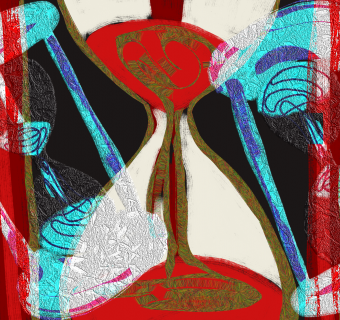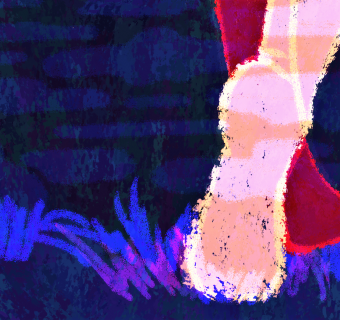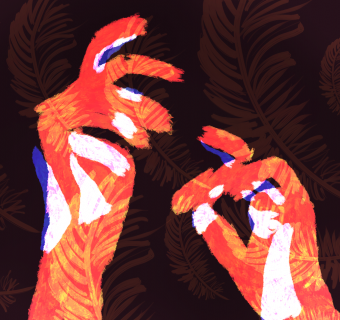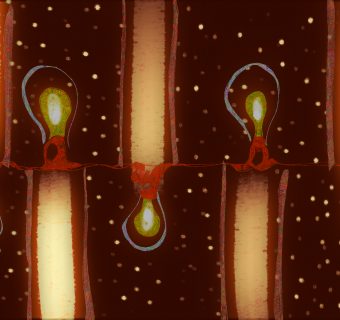I’ve met both sisters of Persephone
one so unlike the other.
quantitative versus qualitative
masculine versus feminine
machine versus nature
STEM versus liberal arts.
My English professor calls it a game of sorting–
crunchy stuff versus mushy stuff
line after line, I watch him color-code poetry and sit both sisters in a four-cornered box.
I empathize with the dual existence Sylvia Plath grapples with in her poem “Two Sisters of Persephone.” One sister is wife and mother-“sun’s bride” growing “quick with seed.” The other is a writer, a laborer, perhaps one of the many female “computers” of that time, sitting at a “barren enterprise” as “dry ticks mark time” on a “mathematical machine.” Plath grapples with the primary question of second-wave feminists that can still hold relevance today: home or career? What does a work-home balance even look like? Can women really have it all? I think of must-dos and want-to-dos as the seasons change. Persephone picks up the pomegranate.
On the brink of graduation, I too teeter between labor and love, head against heart. I hold both sisters in the palm of my hands like a prayer. I have a nearly complete STEM major. I have a boatload of creative interests. One is work. The other is play. Which will I give most importance to today?
I think many children of immigrants can relate when I say there’s always been a bold distinction between work and passion growing up. It’s unlikely we will ever be one of those elusive “somebodies” who love their work. That’s the stuff out of movies and books, both sticky with hope. Reality is that unless your dream is to get a lukewarm, decent-paying job, it’s not worth pursuing. “You know the way it is,” says Hasan Minhaj in his stand-up comedy film Homecoming King. “Middle management till we die. We’re not on the stage, ever.” So, grow up and say it with me: stability above all else.
Now, I wait impatiently to get through the school day, watching the clock until it’s time to do what I want: take a long bath where I forbid myself from thinking, sit outside and watch the stars, write that book sitting in my brain. Like the sun and moon, I chase down items on my to-do list just to catch free time, and in trying to do both, I lose them both.
classes, homework, pay periods, and interviews
I wrestle with time for more hours in the day when I can finally
finally
sit down with that cup of coffee and let my mind wander free
work on that new passion project
the one I want to spend my entire day doing but I can’t because–
classes, homework, pay periods, and interviews
like clockwork the day disappears
hamster on a wheel
each rung brings me closer
advance to free time
each rung brings night nearer
a millisecond left behind
I race
Time, who wears Hermes’ winged sandals
only to tell Persephone’s mushy sister to wait
“Work now, play later.”
hopes are built
comes knock down.
When you’re a child, you’re told you can be anything in the world.
In high school, you’re told the pool is smaller.
In college, you’re told to think about it later.
In university, you’re told, “Make it big tomorrow.”
so, you get that nice, stable job.
now, what?
Is it time yet? Are we there yet? Can I play now? How about now?
when is it the right time to yank the chain?
flush the drain
no more cushy safety nets of Plan Bs and Cs
swim out to sea
risk failure and be free
never settle for less than your dreams.
because
once you get the nice, stable job
what will Big Sister tell you this time?
quantitatively
reasonably
to call you away
a promotion? Marriage?
Before that biological bomb explodes above your head
“Bear a king
Turned bitter
Worm-husbanded, yet no woman.”
I read an article recently called “A woman’s greatest enemy? A lack of time to herself.” It talks about creative genius and what it takes to succeed: “What struck me most about these creative geniuses - mostly men - was not their schedules and daily routines, but those of the women in their lives. Their wives protected them from interruptions; their housekeepers and maids brought them breakfast and coffee at odd hours; their nannies kept their children out of their hair.” Martha Freud laid out Sigmund’s clothes every morning. Marcel Proust’s housekeeper, Celeste, brought him his daily coffee, croissants, newspaper, and mail and was always on hand whenever he wanted to chat. Gustav Mahler married a promising young composer named Alma, then forbade her from composing, saying there could be only one in the family. Instead, she was expected to keep house and join him for long silent walks while he composed in his head.
I step into the shoes of a male genius between every semester. Unburdened by a schedule imposed on me by school and work, I create my own. I light a candle. I sit outside. I wander the halls of my mind and listen to myself think. In the hustle and bustle of life, they’ve gone neglected, unlistened to.
bottled up, brushed aside, put on pause to catch the bus
unbridled, unstressed, she melts like butter now
short of heaven on the slow lane
chugging, steady, a rhythmic heartbeat
A Disney Pixar’s Soul
in “the zone”
a bulbous light of blue
lost in a euphoric trance
stripped bare
truelook how productive she is without you demanding production.
capitalism, capitalism
I don’t need your wage to motivate
doing what I love to do
I sit in the now
start to smell colors
given time and comfort to get all quiet
creativity knocks against my skull
I’m going to write tonight
give voice to the voices in my head
And Yet–
This is my male genius at work. I am in my father’s home. He pays the rent. I am in my mother’s kitchen. She provides me with food. My needs taken care of, serviced, and loved, I self-indulge. Is this, then, hypocrisy? Can my passions be love if they harm and burden others? If they foster guilt?
“Unlike the male artists, who moved through life as if unfettered time to themselves were a birthright, the days and life trajectories of the handful of female artists…were often limited by the expectations and duties of home and care,” reads the article. “Alice Munro wrote in the ‘slivers’ of time she could find between housekeeping and childrearing. And Maya Angelou got away from the pull of home by leaving it altogether, checking herself into an unadorned hotel room to think, read and write. If what it takes to create are long stretches of uninterrupted, concentrated time, time you can choose to do with as you will, time that you can control, that’s something women have never had the luxury to expect, at least not without getting slammed for unseemly selfishness.”
there’s a whole sky separating my two celestial lovers
a cavern between love and labor
I’ve watched my father work for the people he loves.
I’ve watched my mother love him for being someone who works
while her own work goes unnoticed.
Where do I sit on this seesaw?
And which way does it lean?
What’s the right way to be a woman with a creative soul?
What’s the right way to be South Asian daughter
burdened by expectations yet still yearning for “the zone?”
How should I stand on this threshold of capitalism
whose gears churn past the graduation stage?
they wait not for me
I must leap and board
then the cogs will turn forever
underfoot lies crushed a SoulI sit in my cubicle and count the days to an eclipse
I can’t believe there’s not more to life than this
when the sun and moon collide
labor and love meet









